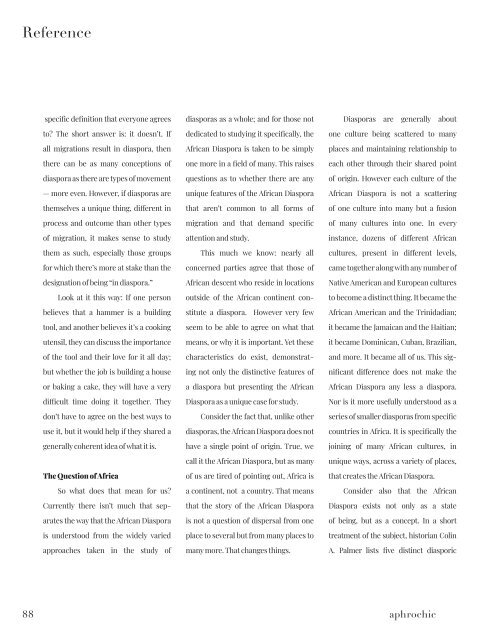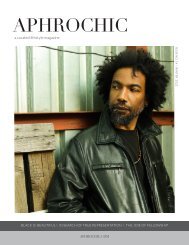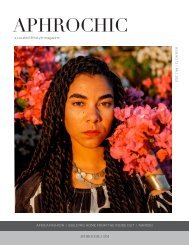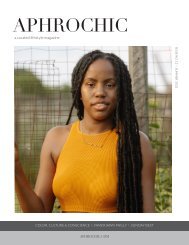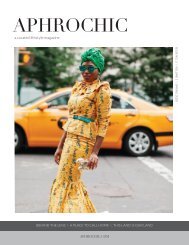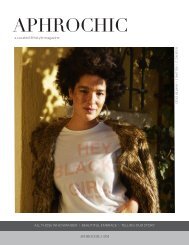AphroChic Magazine: Issue No. 1
Welcome to the Fall 2019 issue of AphroChic Magazine. Designed to celebrate the presence, innovation and accomplishments of creatives of color from all corners of the African Diaspora, we welcome the season in this issue with a focus on fashion, authentic beauty, and creating moments that bind us together. On the cover, New York fashion stylists, Courtney and Donnell Baldwin of Mr. Baldwin Style invite us to experience a fête in a historic part of Sag Harbor. We take a look inside the Brooklyn home of fashion designer and movement artist, Nana Yaa Asare-Boadu and experience her effortless aesthetic. Then, we go half way around the world on a photographic journey of Morocco, with photographer Lauren Crew. Along the way, you’ll find articles that explore the nature of the African Diaspora, the importance of the Black family home, and the books, art and accessories you’ll want to bring home this season.
Welcome to the Fall 2019 issue of AphroChic Magazine. Designed to celebrate the presence, innovation and accomplishments of creatives of color from all corners of the African Diaspora, we welcome the season in this issue with a focus on fashion, authentic beauty, and creating moments that bind us together.
On the cover, New York fashion stylists, Courtney and Donnell Baldwin of Mr. Baldwin Style invite us to experience a fête in a historic part of Sag Harbor. We take a look inside the Brooklyn home of fashion designer and movement artist, Nana Yaa Asare-Boadu and experience her effortless aesthetic. Then, we go half way around the world on a photographic journey of Morocco, with photographer Lauren Crew. Along the way, you’ll find articles that explore the nature of the African Diaspora, the importance of the Black family home, and the books, art and accessories you’ll want to bring home this season.
You also want an ePaper? Increase the reach of your titles
YUMPU automatically turns print PDFs into web optimized ePapers that Google loves.
Reference<br />
specific definition that everyone agrees<br />
to? The short answer is: it doesn’t. If<br />
all migrations result in diaspora, then<br />
there can be as many conceptions of<br />
diaspora as there are types of movement<br />
— more even. However, if diasporas are<br />
themselves a unique thing, different in<br />
process and outcome than other types<br />
of migration, it makes sense to study<br />
them as such, especially those groups<br />
for which there’s more at stake than the<br />
designation of being “in diaspora.”<br />
Look at it this way: If one person<br />
believes that a hammer is a building<br />
tool, and another believes it’s a cooking<br />
utensil, they can discuss the importance<br />
of the tool and their love for it all day;<br />
but whether the job is building a house<br />
or baking a cake, they will have a very<br />
difficult time doing it together. They<br />
don’t have to agree on the best ways to<br />
use it, but it would help if they shared a<br />
generally coherent idea of what it is.<br />
The Question of Africa<br />
So what does that mean for us?<br />
Currently there isn’t much that separates<br />
the way that the African Diaspora<br />
is understood from the widely varied<br />
approaches taken in the study of<br />
diasporas as a whole; and for those not<br />
dedicated to studying it specifically, the<br />
African Diaspora is taken to be simply<br />
one more in a field of many. This raises<br />
questions as to whether there are any<br />
unique features of the African Diaspora<br />
that aren’t common to all forms of<br />
migration and that demand specific<br />
attention and study.<br />
This much we know: nearly all<br />
concerned parties agree that those of<br />
African descent who reside in locations<br />
outside of the African continent constitute<br />
a diaspora. However very few<br />
seem to be able to agree on what that<br />
means, or why it is important. Yet these<br />
characteristics do exist, demonstrating<br />
not only the distinctive features of<br />
a diaspora but presenting the African<br />
Diaspora as a unique case for study.<br />
Consider the fact that, unlike other<br />
diasporas, the African Diaspora does not<br />
have a single point of origin. True, we<br />
call it the African Diaspora, but as many<br />
of us are tired of pointing out, Africa is<br />
a continent, not a country. That means<br />
that the story of the African Diaspora<br />
is not a question of dispersal from one<br />
place to several but from many places to<br />
many more. That changes things.<br />
Diasporas are generally about<br />
one culture being scattered to many<br />
places and maintaining relationship to<br />
each other through their shared point<br />
of origin. However each culture of the<br />
African Diaspora is not a scattering<br />
of one culture into many but a fusion<br />
of many cultures into one. In every<br />
instance, dozens of different African<br />
cultures, present in different levels,<br />
came together along with any number of<br />
Native American and European cultures<br />
to become a distinct thing. It became the<br />
African American and the Trinidadian;<br />
it became the Jamaican and the Haitian;<br />
it became Dominican, Cuban, Brazilian,<br />
and more. It became all of us. This significant<br />
difference does not make the<br />
African Diaspora any less a diaspora.<br />
<strong>No</strong>r is it more usefully understood as a<br />
series of smaller diasporas from specific<br />
countries in Africa. It is specifically the<br />
joining of many African cultures, in<br />
unique ways, across a variety of places,<br />
that creates the African Diaspora.<br />
Consider also that the African<br />
Diaspora exists not only as a state<br />
of being, but as a concept. In a short<br />
treatment of the subject, historian Colin<br />
A. Palmer lists five distinct diasporic<br />
<br />
aphrochic


